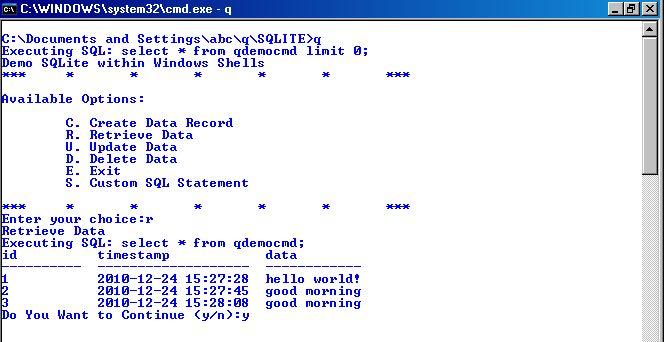

The largest possible key has previously existed in that table, then One more than the largest key that has ever existed in that table. Unique over the lifetime of the table, add the AUTOINCREMENT keyword Have been previously deleted from the table. The new key will be unique overĪll keys currently in the table, but it might overlap with keys that Note that the integer key is one greater than the largest key that was There is a function named sqlite3_last_insert_rowid() which will return the integer key for the most recent insert operation. Is logically equivalent to saying: INSERT INTO t1 VALUES((SELECT max(a) FROM t1)+1,123) With this table, the statement INSERT INTO t1 VALUES(NULL,123) sqlite> create table test (id integer primary key autoincrement, name varchar(20)) sqlite> select from test sqlite> insert into test (name) values ('hello1') sqlite> insert into test (name) values ('hello2') sqlite> select from test id name. For example, suppose you have a table like this: CREATE TABLE t1( What version of SQLite are you using I am using SQLite version 3.8.11.1.Primary key values are not resetting. Or, if the largest existing integer key 9223372036854775807 is in use then an unused key value is chosen at random. Longer answer: If you declare a column of a table to be INTEGER PRIMARY KEY, then whenever you insert a NULL into that column of the table, the NULL is automatically converted into an integer which is one greater than the largest value of that column over all other rows in the table, or 1 if the table is empty. Short answer: A column declared INTEGER PRIMARY KEY will autoincrement. Context: SqlProvider(Sql2008) Model: AttributedMetaModel Build: 4.6.81.0 Input String (Size = 4000 Prec = 0 Scale = 0) Here is what I'm seeing in the log output: INSERT INTO () SubmitChanges(ConflictModeįailureMode)\r\n at .SubmitChanges()\r\nĪt (String args) in Program.cs:line 29" StandardChangeDirector.Insert(TrackedObject StandardChangeDirector.DynamicInsert(TrackedObject UserArguments, ICompiledSubQuery subQueries)\r\n at QueryInfo queryInfos, IObjectReaderFactory factory, Object SqlProvider.ExecuteAll(Expression query, ParentArgs, Object userArgs, ICompiledSubQuery subQueries, Object QueryInfo queryInfo, IObjectReaderFactory factory, Object ExecuteDbDataReader(CommandBehaviorīehavior)\r\n at .ExecuteReader()\r\nĪt .SqlProvider.Execute(Expression query, StrSql, SQLiteStatement previous, UInt32 timeoutMS, String&

SQL logic error or missing database\r\nnear \"SELECT\": syntax errorĪt 3.Prepare(SQLiteConnection cnn, String SQLiteConnection connection = new SQLiteConnection(connectionString) ĭataContext db = new DataContext(connection) Ĭom.InsertOnSubmit(new TestTable ", TestTable.id, TestTable.title) String connectionString = Source = c:\pathToDB\test.s3db" One thing to note is if I take out the IsDbGenerated =true above and enter the id manually it does insert fine, but I'd like it to AUTOINCREMENT and for some reason the IsDbGenerated=true is killing the insert. When it goes to submit I get a error, I'll paste the error below this example. I've tried this with/without the AUTOINCREMENT CREATE TABLE ( INTEGER NOT NULL PRIMARY KEY AUTOINCREMENT, TEXT NULL)

I'm having an issue with the id AUTOINCREMENT field when using the linq mapping attribute IsDbGenerated = true.


 0 kommentar(er)
0 kommentar(er)
